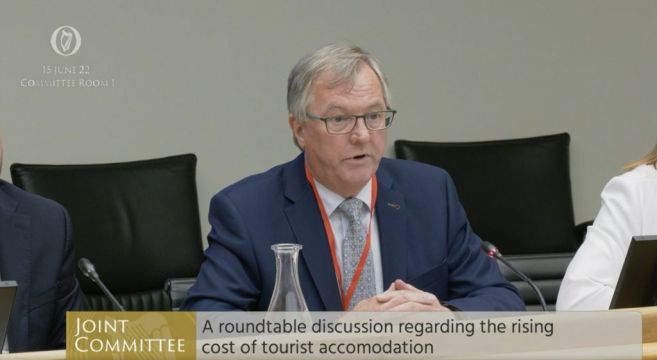Focusing on the high rates of the last available hotel rooms could do reputational damage to Ireland’s tourism industry, hotelier representatives have told a committee.
Tim Fenn, CEO of the Irish Hotels Federation, told the Oireachtas Committee on Tourism, Culture, Arts, Sport and Media that there was a need to grow the supply of hotels in Dublin.
“The key challenge for us is that at the moment, Dublin doesn’t have enough supply. Dublin is a really, really attractive city. There’s great value in Dublin.
“But the problem is, is we’ve come to a stage where there’s going to be nights, particularly for maybe some of these football matches, some of these big concerts, where Dublin hasn’t got the capacity to deal with it,” he said.
TD Christopher O’Sullivan and Senator Malcolm Byrne said that they did not accept the high hotel prices was down to a lack of supply.
When asked by O’Sullivan whether extortionate prices in Dublin are doing reputational damage to the rest of the country, Mr Fenn said: “The focus on the last available rates is very risky, because that in itself creates reputational damage.”
Eoghan O’Mara Walsh, CEO of the Irish Tourism Industry Confederation, said that some of the hotel prices cited by committee members were too high, but were not reflective of the average hotel price.
“I think they are excessive, I wouldn’t be purchasing them. But I don’t think they’re reflective of the wider industry.
“It’s interesting when you said you looked online and found six properties tonight in Dublin, there’s possibly 22,000 bedrooms in Dublin.
“Which I think is a sign that Dublin is full tonight,” he said.
The committee heard that pent-up demand post-pandemic, deferred bookings, and consumer savings have contributed to a surge in demand for tourism services.
Mr Fenn said that there is “significant value” across Irish hotels, and said that “the challenge we have is a lack of supply”.
“The challenge we have is that because there’s a lack of supply, when you get down to those last few rooms, they’re going to cost a lot more than you might want.
“We’re hoping that by the end of 2024 there might be another 5,000 rooms coming into the market, and maybe more again. But that’s the real issue here.”
Denyse Campbell, President of the Irish Hotels Federation, said that “pent up demand is huge”, and that the issue was there is a “total lack of supply”.
“As we approached June 2022, we had 80 per cent of business done. So 80 per cent of 44 hotels in Dublin.
“In 2019, that was 65 per cent. So already there’s pressure on the capacity in Dublin.”
The committee also heard that 45 per cent of the tour bus are bookings that were made and deferred from 2020 and 2021.
Sinn Féin TD Imelda Munster said Dublin was charging “extortionate” “rip-off” hotel room rates compared to other European cities.
She said that the cheapest room for one night on the second week in July in Dublin was for €379 with no breakfast. This compares to a four-star hotel in Madrid at €120, four-star in Lisbon at €141, Paris was €147 and Amsterdam was €141.
“You’re going to drive people out. The huge reputational damage that you’re doing to this country as a value for money destination is vast. You’re not thinking in the long term.
“And domestic tourism that did support you, when you were pleading for help and support, they’re not going to forget.”
Senator Micheál Carrigy suggested that legislation might be needed to prevent prices from being increased when big events are on in the capital city.
“If a hotel bed on a Saturday night in September is €150 for a night and then Bruce Springsteen announces a concert, and that bed then goes to €350, that’s not right.
“And maybe we need to look at legislation that will stop that.”
Fine Gael TD Brendan Griffin criticised high prices for car rentals as “economic treason”.
“I think at this stage it has got so bad that we’re going to have to do the equivalent of AirBnB for car rental,” he said.
The committee heard that an average of 40% of Ireland’s annual holiday visitors need cars to get around the country, and that high car-rental prices would be “detrimental” to the revival of the tourism sector post-pandemic.
Paul Kelly, CEO of Fáilte Ireland, told the committee that this was what he was “most worried about”.
He said that high VAT and VRT rates are making the car rental model “exceptionally more expensive”, and that the industry has fed back to him that if there is not a change in that tax model, “it’s still not going to be economical for car rental companies to significantly increase their seasonal stock”.
“We’re in incredibly uncertain times, and although it’s looking rosy now for the next few months, there’s a lot of concern around quarter four this year, a lot of concern around next year’s bookings because it’s just so uncertain.”







